
Thankfully, the new version of DaisyDisk (4.10) is making it much easier to reveal the macOS’ hidden space, and for the part that cannot be revealed - understand its internal structure and even provide tools to reclaim it by demand. However, in certain cases, you just need to free up the space urgently, and it’s quite confusing that you don’t have control over a big chunk of your disk.

This is how macOS Catalina works and it’s not supposed to even be a problem or require any maintenance from the user. However, the backup process is continuous and therefore there is always a certain amount of disk space that is locked by macOS for the snapshots. Eventually when the snapshots get transferred to the permanent storage, such as the Time Capsule, or as the snapshots become too old and get replaced by newer ones, macOS releases the disk space. The reason for this problem is that macOS is making temporary backups of the system, so called local snapshots, temporarily locking big amounts of disk space in an area of the disk that is fully opaque to the users.


A quick scan in DaisyDisk typically reveals a big chunk of " hidden space", which means the system is using more disk space than it’s possible to reveal by scanning, even with elevated permissions ( scanning "as Administrator").
Mac lilyview full#
Ever since macOS Catalina was introduced, many Mac users noticed that their disks eventually get full without obvious reason.


 0 kommentar(er)
0 kommentar(er)
